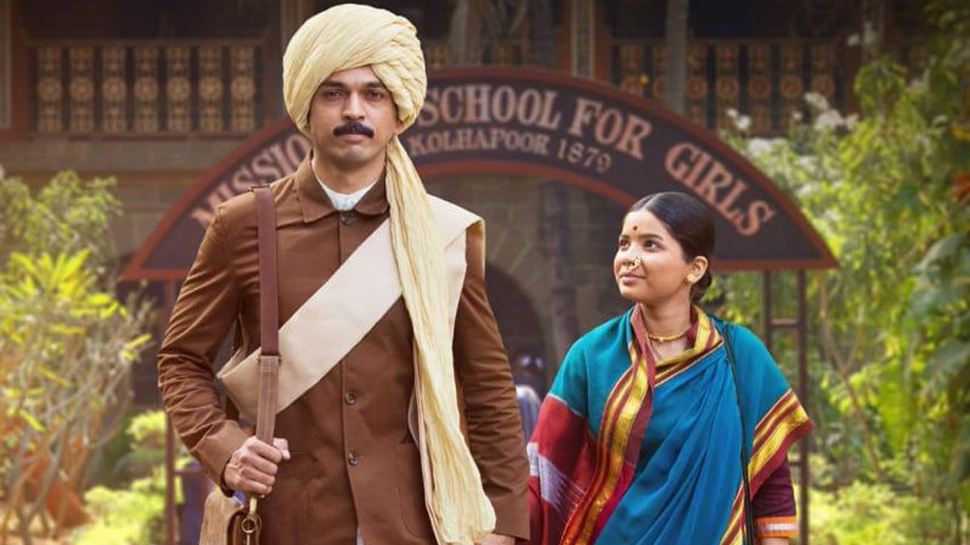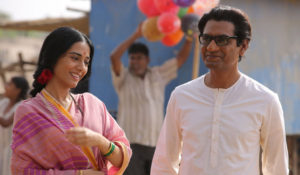
It is nineteenth-century British India and a moderate Hindu family from Kalyan, Maharashtra is discussing an alliance for their 9-year-old daughter Yamuna. The matchmaker describes the prospective groom as ‘whimsical’. Now, from the looks of it, it isn’t a family that might comprehend the gist of the word. It might not even be the right word to describe the man who desired anything but a perfect housewife in Yamuna. This unusual framework is from where director Sameer Vidwans develops his unexpectedly witty Marathi biographical drama, Anandi Gopal.
Based on the life of India’s first practising female physician Anandibai Gopalrao Joshi, the film, on the surface, is a basic empowerment tale. Married off at a nascent age as per tradition, Yamuna is rechristened Anandi on the day she exchanges vows. Her husband Gopalrao, a widower, is a post office clerk with an adept hunger to seek knowledge – for himself and more so for the woman in his life. That way, Anandi Gopal in various ways becomes a film about a man’s quest to bring about change with education as opposed to the titular character’s penchant to learn.
Not very late after Anandi reaches her husband’s home, she sees herself building a family with her husband’s deceased wife’s mother and also with his son, Krushna. A devout widow, the mother-in-law is a picture of austerity. The writers attempt to lend layers to her silences which do not fully work. As a result, her dissent towards Gopalrao’s progressive ideas wanders on the periphery without ever really soaring.
Besides the need to assimilate ideas from the texts, a good part of Anandi Gopal is spent in Gopalrao educating his wife about her fundamental rights – long before they had it all documented in the Indian constitution. You see the man exert verbal pressure and intimidate the child bride in a way that a discompassionate teacher would do to a student. In one of the scenes, Gopalrao is seen apologizing to Anandi for a misgiving. “I am sorry,” says he, expecting a response in the English language. He repeats the line with double the aggression. A terrified Anandi replies, “It’s alright,” It was never really the will of Anandi to live this unusual life that was orchestrated by the man of her life. For a fact, Anandi Gopal, rarely declares the thoughts that run through the timid young girl’s mind.
Seen almost fully through the man’s eyes, the film, as a result, takes light years to provide some agency to its female protagonist. In one of the key sequences, Anandi refuses to get converted to Christianity. Crowd-pleasing in its very design, the moment is one that stimulates thunderous applause as you see the young woman standing up for her choice of religion. This is perhaps a rare instance where Gopalrao seems to have oppressed her and knowingly so. Behind the conversion gimmick, lay their ticket to a better life – one in the United States of America – where Anandi could pursue medical studies without hassles.
Towards the finale, you see Anandi gathering courage – all empowered by her education. “Now you have overtaken me and I feel extremely proud,” beams Gopalrao, making way for a narrative trajectory that is acutely familiar and, therefore, unsurprising and somewhat unexciting. The grand convocation speech by a Tuberculosis-stricken Anandi might be evocative on papers but it is in the straightforward, dramatic execution that the material comes unstuck.
Character development is fairly seamless for the principal characters whereas the supporting ones suffer. For instance, one never really get to see a friendship bloom between Anandi and her stepson even though we are faintly aware of its existence. After all, Anandi was closer to Krushna in age than she was to her husband. Anandi’s classmates in the Kolhapoor Missionary Girls’ School are unduly plastic and their way of ragging the Indian girl feels way too repetitive. Her friendship with the headmistress is one that we expect to flourish but it never does. Another fascinating character is that of Ms Carpenter with whom Anandi corresponds via letters. The lady never appears in person and the film is equally unequipped to make her presence felt through words.
As if to compensate, Anandi Gopal scores consummately in pivotal technical departments. The production design (Nilesh Wagh) and costumes (Sachin Lovalekar) play a major role in transporting us to the era. Additionally, these are significant from the perspective that the film is about anything but India’s struggle for independence. Cinematography (Akash Agarwal) throws in a bunch of surprises with clever pans and tilts against the usual tracking shots. There are rare wide shots and whenever they appear – mostly by the beach side – the DOP etches out painting-like frames. Anandi Gopal also finds thorough usage of musical elements (scored by Hrishikesh-Saurabh-Jasraj). While the worded songs are extremely melodious, fitting well in the narrative, the original score is even better as it keeps you engaged through proceedings that might otherwise prove familiar and even borderline dreary.
Sameer Vidwans manages to extract honest performances from the ensemble cast. Lalit Prabhakar is superb as Gopalrao whose mind-space is an altogether different territory to associate with. First-timer Bhagyashree Milind who plays Anandi is a terrific actor and she aces the part with her underplaying skills on point. A treat as always, Geetanjali Kulkarni’s presence is enough to make the viewers admire her sketchy character. She is a sight to behold, especially as she confronts certain religious extremists who create a ruckus in her compound.
As the film closes, it is impossible to not feel sad about Anandibai’s short life and career. Yet, before you could empathize a little with the character and the man in her life, Anandi Gopal throws at you a montage of women achievers from India. So, alright, we know that these women (including Anandi) have served the nation for fruitful causes but can we not absorb the story and its pathos, please?
So yes, Sameer Vidwans’ film is clearly a very good attempt with a sparkling dose of subtle humour and accurate chronicling of the era. Still, the film – particularly in the final reels – does not match up to the promise it springs in the first two acts. That said, Anandi Gopal is a must-watch for its empowering story and a set of balanced key acts.
Rating: ★★★ 1/2

